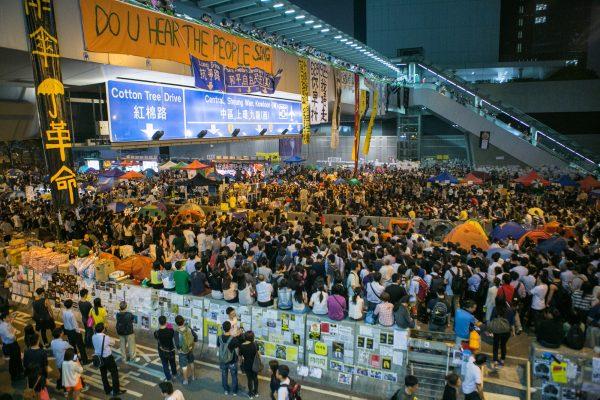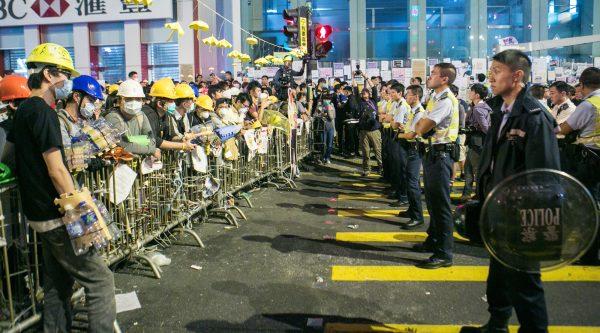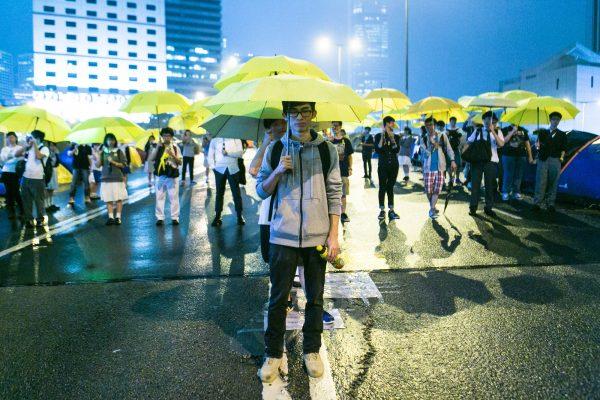HONG KONG—A dozen members of the U.S. Congress have nominated Hong Kong’s pro-democracy movement and its most prominent student leaders for this year’s Nobel Peace Prize.
In nominating Joshua Wong, 21, and his colleagues Nathan Law, 24, and Alex Chow, 27, who led tens of thousands in the former British colony’s largest pro-democracy protest in late 2014, the lawmakers wanted to recognize “their peaceful efforts to bring political reform and self-determination to Hong Kong.”
The protests were part of a populist uprising that became a major political challenge for Chinese Communist Party rulers in Beijing, who took control of the territory from the British in 1997, as part of the terms of the Sino-British Joint Declaration.
The Declaration guaranteed the “one country, two systems” principle, which promises Hong Kong a high degree of autonomy and freedoms not enjoyed in mainland China, such as freedom of speech and an independent judiciary. But many observers see a gradual erosion of those freedoms since 1997. Meanwhile, dissent against the Party’s encroaching influence in Hong Kong has drawn Beijing’s ire.

“Hong Kong’s pro-democracy advocates have made significant contributions to peace by actively seeking to safeguard the future of Hong Kong at precisely the time that Beijing has taken steps to undermine Hong Kong’s long-cherished autonomy,” four Democrats and eight Republicans, including former presidential hopeful Marco Rubio, told the Nobel Peace Prize Committee in a letter.
If Wong wins, he would be the second youngest person to receive a Nobel Prize after Pakistan’s Malala Yousafzai, who was 17 when she became a laureate in 2014. The winner will be announced in October.
Tens of thousands of protesters, some wielding umbrellas to shield themselves from tear gas and pepper spray attacks by local police, set up camp in the city’s major thoroughfares for 79 days in late 2014, demonstrations which grabbed international headlines and social media attention. The protests were dubbed the #UmbrellaMovement.

But the mostly peaceful protests failed to pressure Hong Kong and Beijing authorities to grant citizens universal suffrage to vote for the city’s leader.
Critics have decried a series of subsequent “payback” incidents, including months-long jail terms for the Peace Prize-nominated trio and, most recently, a ban on Wong’s ally, Agnes Chow, from running in a legislature by-election.
Hong Kong authorities have denied political interference, saying everything was done in accordance with the law.
Wong, who faces two appeals over separate jail sentences, said he hoped the nomination would give more bargaining power to the city’s democratic movement.
“I believe the nomination would show the international community and [Chinese leader] Xi Jinping how the young generation will persist in fighting for democracy, even if we have to face imprisonment or a permanent ban from public office,” Wong said.

The nominations provoked anger from Beijing, who say the city is an inalienable part of China.
In a statement sent to Reuters, China’s Foreign Ministry said that Wong and the others involved in the protests had been punished in accordance with the law.
“We urge the relevant U.S. Congressmen to stop interfering in Hong Kong and China’s internal affairs, and do more to benefit the development of Sino-U.S. ties rather than the opposite,” it said.
China’s only Nobel Peace Prize winner, dissident intellectual Liu Xiaobo, died last July, becoming the first Nobel Laureate to die in custody since Carl von Ossietzky died under Nazi Germany’s watch in 1938.
His wife, Liu Xia, said to suffer from severe depression, is still under effective house arrest.
Reporting by Venus Wu and Ben Blanchard. Annie Wu of The Epoch Times contributed to this report.





